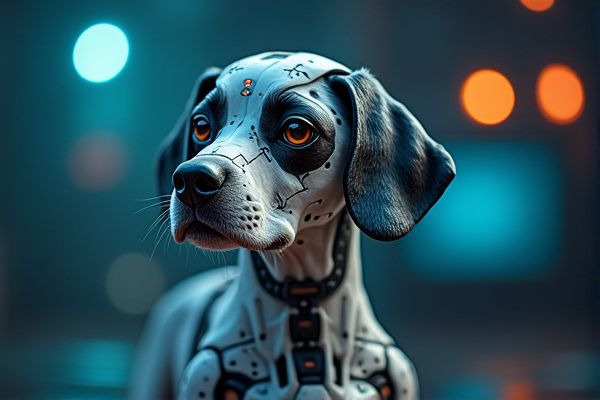
AI technology enhances pet care products by enabling personalized nutrition and health monitoring. Smart feeders can adjust portion sizes based on a pet's dietary needs, while wearable devices track vital signs and activity levels to detect potential health issues early. Automated toys equipped with AI can engage pets mentally and physically, reducing behavioral problems. Furthermore, AI-powered apps can help owners manage their pets' health records and appointment schedules efficiently.
AI usage in pet care products
Predictive Health Monitoring
AI usage in pet care products offers the potential for enhanced predictive health monitoring, allowing pet owners to receive early warnings about their animals' health conditions. For example, companies like Petcube utilize AI algorithms to analyze behavioral patterns and detect abnormalities. This can lead to timely veterinary care, improving the animal's well-being and potentially reducing medical expenses. Developing such technology reflects a growing trend in the pet care industry towards smarter, data-driven solutions.
Personalized Nutrition Plans
AI can optimize pet care products by analyzing specific dietary needs based on breed, age, and health conditions. For example, a company like Purina could develop personalized nutrition plans that cater to individual pets. This tailored approach may enhance pet health, improving overall well-being and longevity. The integration of AI in this sector presents a promising opportunity for manufacturers to connect more effectively with pet owners.
Automated Pet Feeders
Automated pet feeders equipped with AI can optimize feeding schedules based on pets' eating habits, potentially improving their health. These devices can learn from data input, allowing for customized portions that prevent overfeeding or underfeeding. Companies like PetSafe are exploring these technologies to enhance user experience and pet satisfaction. Such advancements may lead to better nutrition management for pets, aligning with a growing trend toward smart home integration in pet care products.
Smart GPS Tracking Collars
AI technology can enhance smart GPS tracking collars for pets by providing real-time location data and activity monitoring. This can lead to better safety and health management for pets, as owners can receive alerts and insights about their pet's behavior. Companies like Whistle offer products that integrate AI for improved tracking accuracy and health assessments. The chance for pet owners to utilize these advancements could result in a more informed and proactive approach to pet care.
AI-Powered Pet Cameras
AI-powered pet cameras have the potential to enhance pet care by providing real-time monitoring and interaction capabilities. These devices can analyze pet behavior, offering insights that help owners understand their pets' needs better. For example, a smart camera might alert the owner when their dog shows signs of anxiety, allowing for timely intervention. This technology improves both pet well-being and owner peace of mind, highlighting the advantages of integrating AI into pet care products.
Interactive Pet Toys
AI can enhance pet care products by enabling personalized recommendations for pet food and toys based on individual pet behaviors. For example, interactive pet toys that adapt to a pet's play style can keep them engaged and mentally stimulated. The possibility of utilizing machine learning algorithms allows for continuous improvement in product effectiveness and user satisfaction. This lead to potential advantages in customer loyalty and brand differentiation in a competitive market.
Behavior Analysis and Training
AI technology can enhance pet care products by providing personalized behavior analysis and training solutions. For instance, a smart collar equipped with AI can monitor a pet's activity levels and offer training tips based on their behavior. This approach allows pet owners to gain insights into their pets' needs, potentially improving their overall well-being. The integration of AI in pet training could lead to more effective learning outcomes and stronger bonds between pets and their owners.
Virtual Veterinary Consultations
AI can enhance pet care products by personalizing recommendations based on pet health data. Virtual veterinary consultations provide convenience and accessibility, allowing pet owners to seek advice from professionals without travel. This technology could reduce wait times and improve the speed of diagnosis. Companies like PetMD showcase how AI and telehealth can improve the overall pet care experience.
Health Condition Detection Sensors
AI in pet care products can enhance health condition detection sensors, allowing for early identification of issues such as obesity or diabetes. These sensors can analyze pets' behavior and vital signs, providing real-time data to owners. For example, a product like the PetPace collar monitors heart rate and temperature, offering insights into a pet's well-being. This technology creates opportunities for proactive health management, potentially improving the longevity and quality of pets' lives.
AI-Driven Environmental Enrichment
AI usage in pet care products can enhance the well-being of animals by personalizing their environments based on individual needs. For example, AI-driven environmental enrichment tools can analyze a pet's behavior and adjust stimuli accordingly to keep them engaged. This technology has the potential to improve mental health outcomes for pets, leading to happier and less anxious animals. Companies developing such innovations, like Furbo, might find a competitive advantage in offering tailored solutions to pet owners.
 techknowy.com
techknowy.com